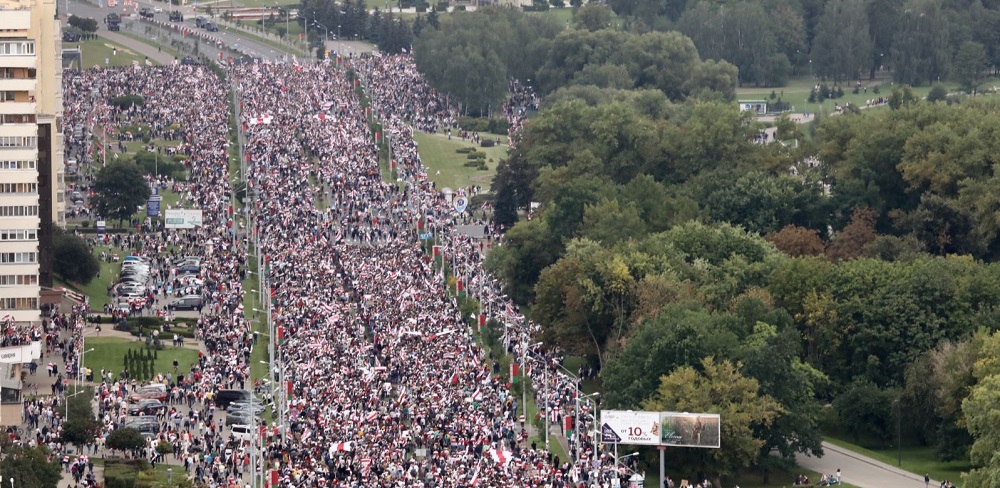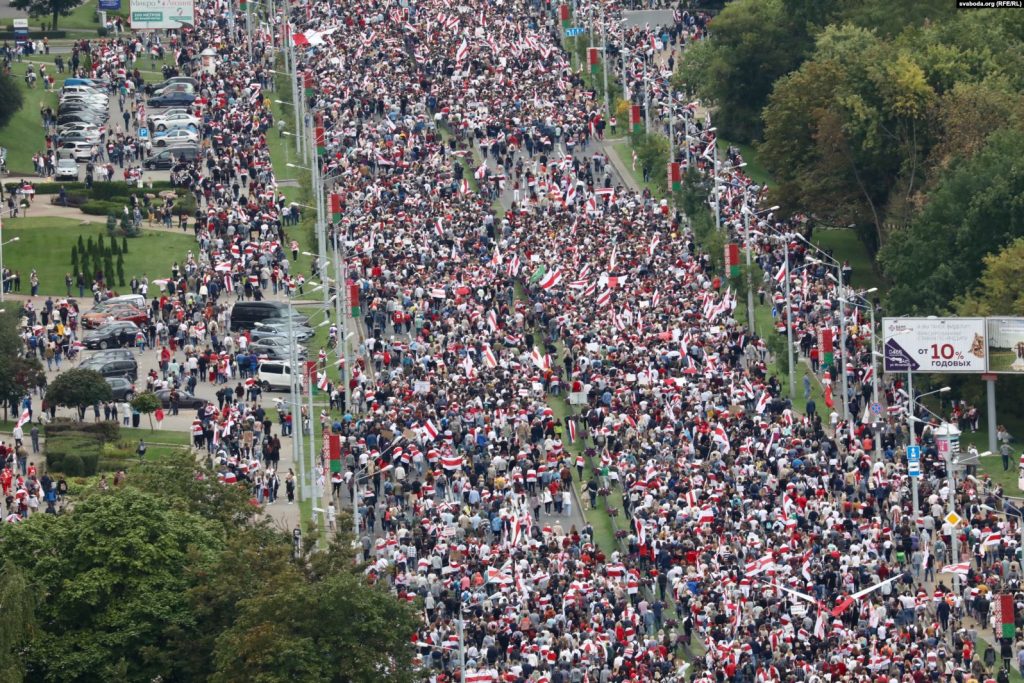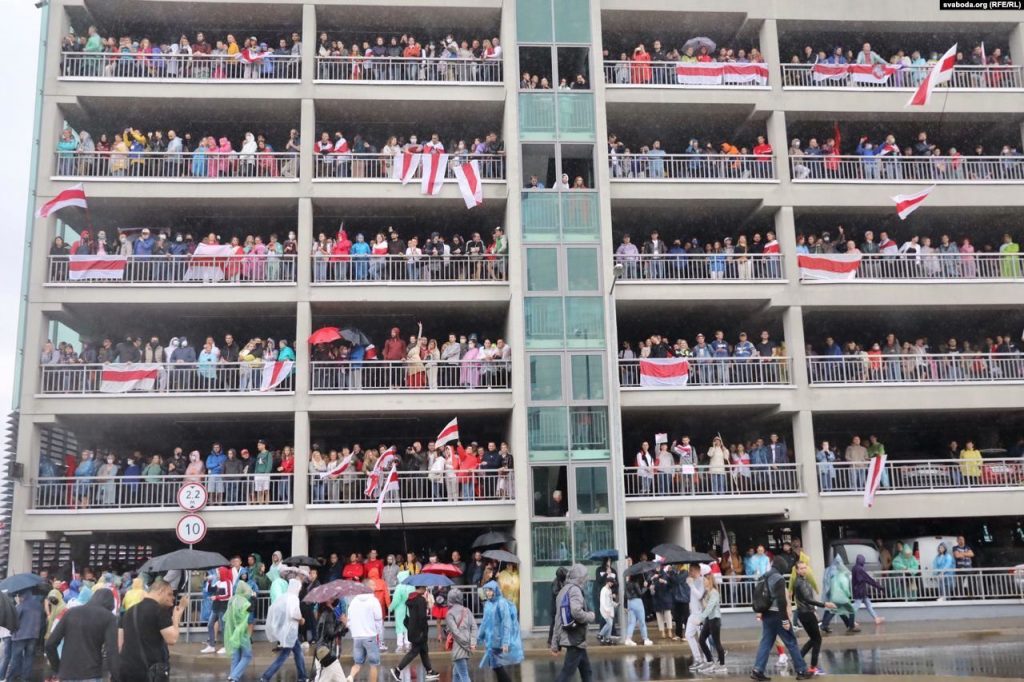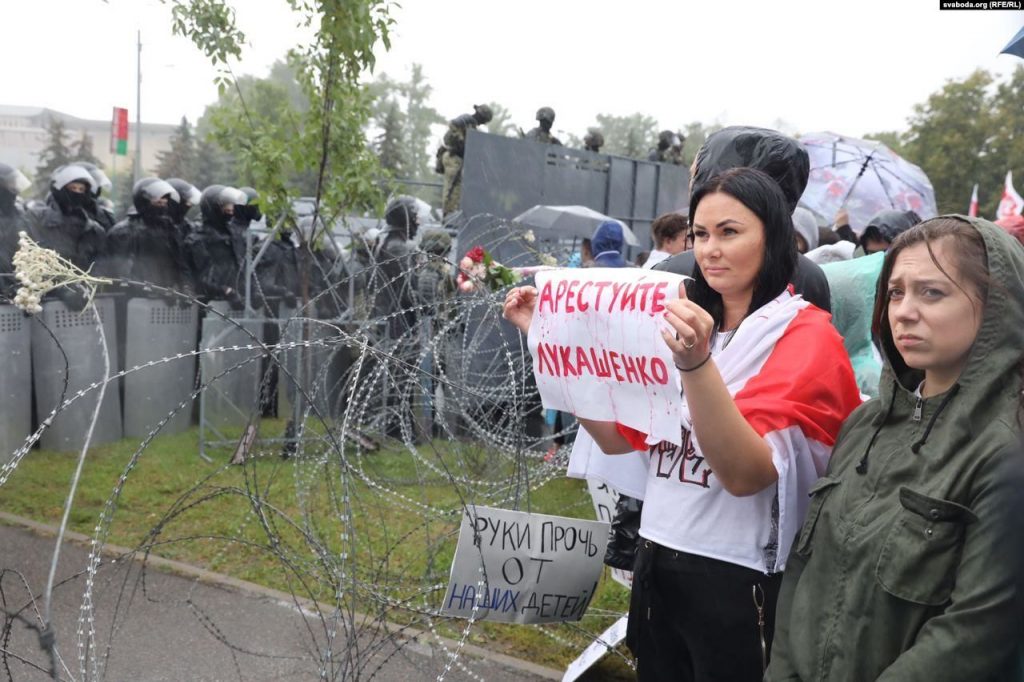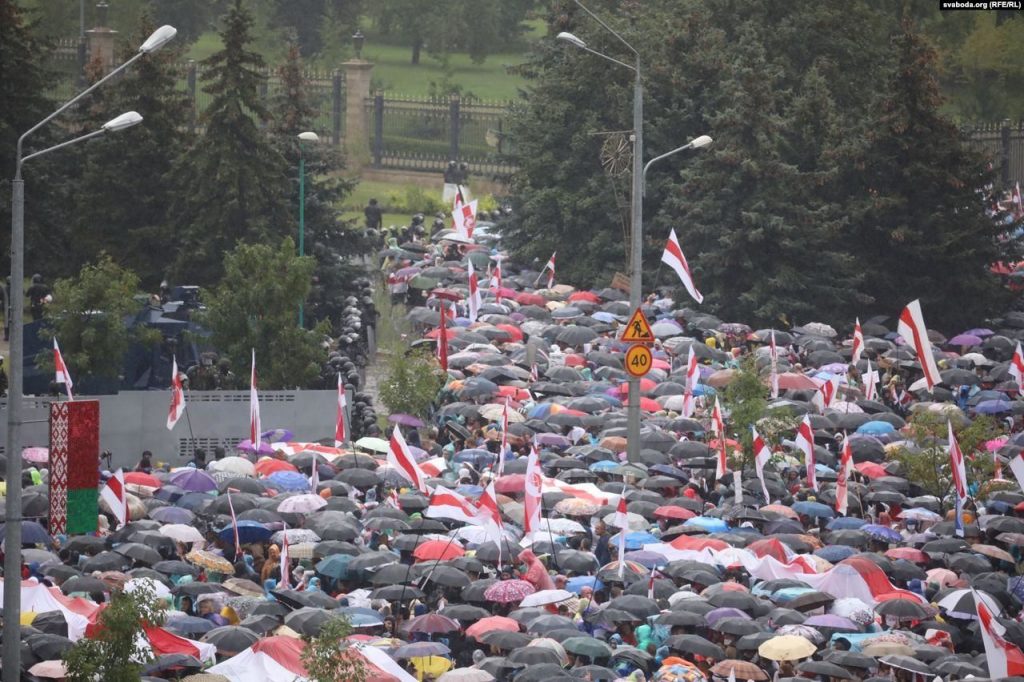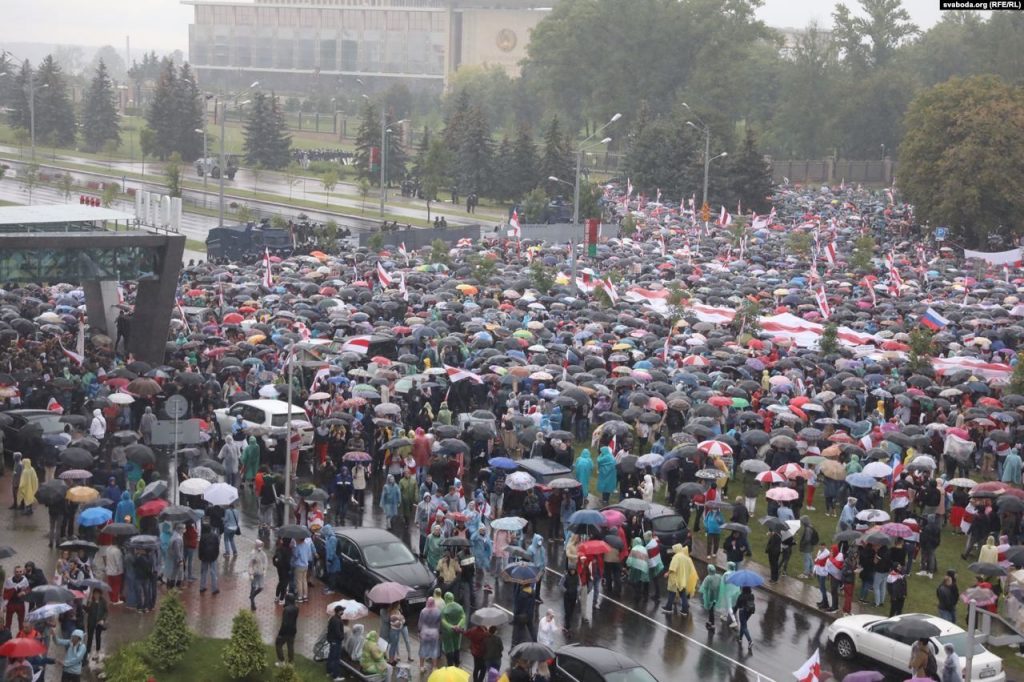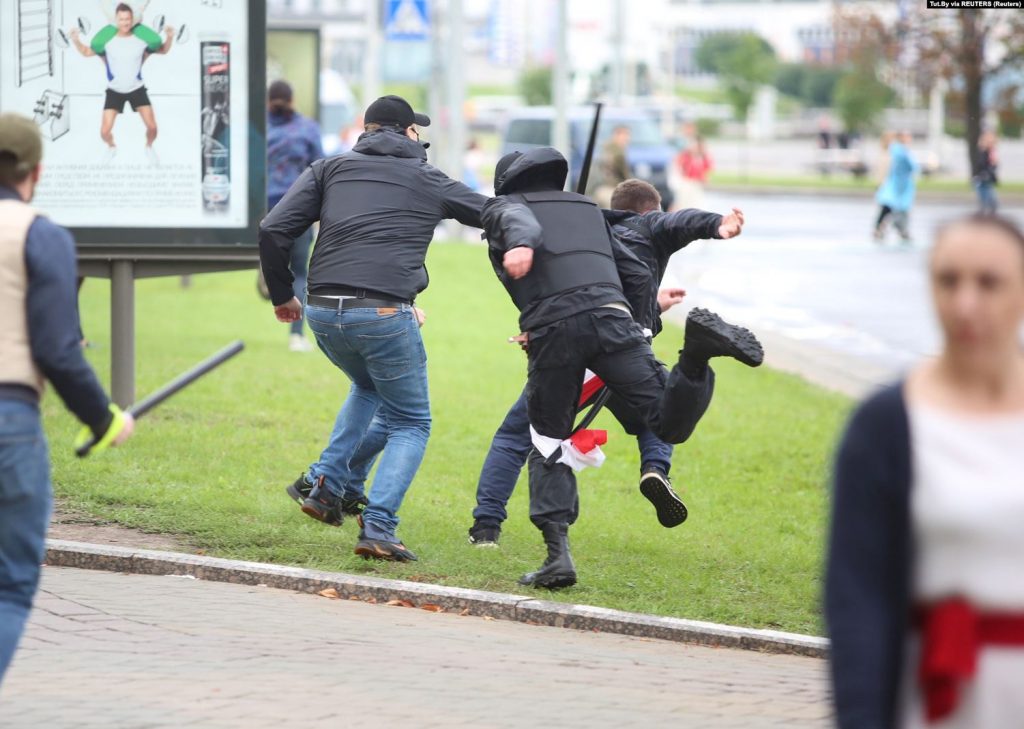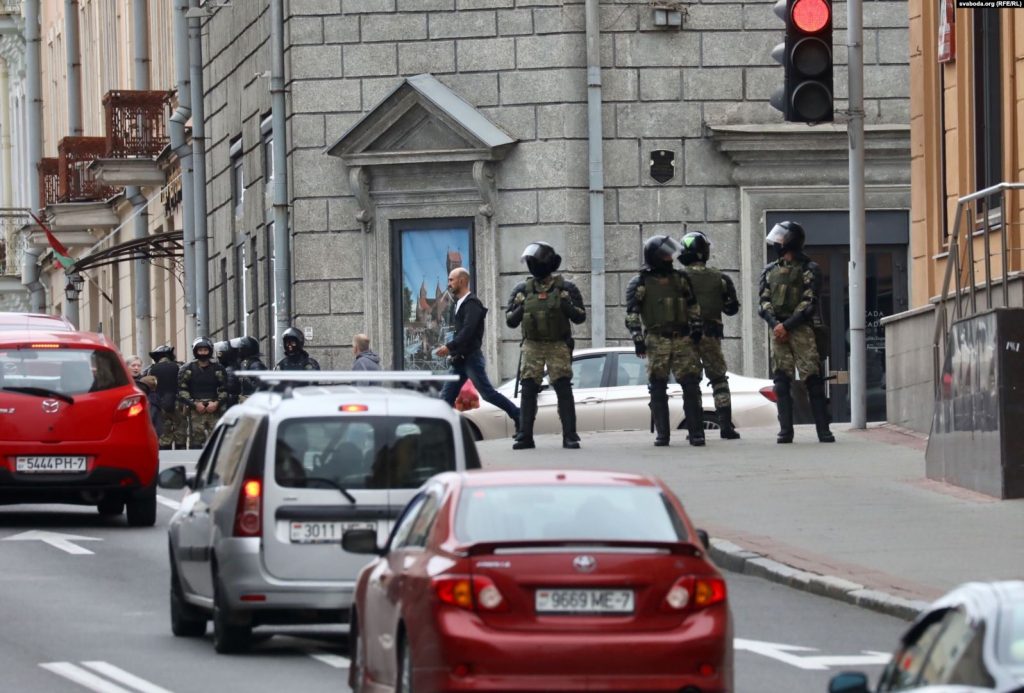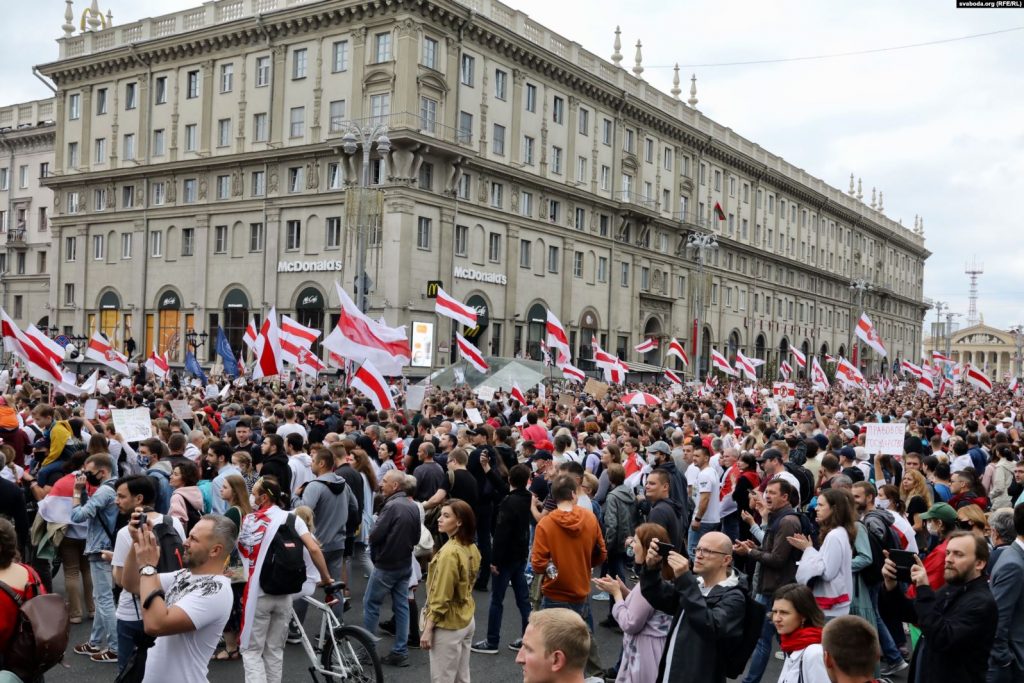Hay una durísima lucha en curso. La voluntad popular por el cambio necesita de nuevos pasos para derrotar a Alexander Lukashenko y al régimen autoritario.
Por Ruben Tzanoff
Por cuarto domingo consecutivo, decenas de miles de personas ganaran las calles de Minsk y de otras ciudades para exigir que se vaya Lukashenko y la celebración de nuevas elecciones. Previamente, la policía advirtió que aumentaría el número de agentes y militares en las calles de la capital. El mismo día de la manifestación hubo 633 personas detenidas, algunas de ellas en los barrios de la capital. Las fuerzas de seguridad bloquearon los accesos a las principales avenidas céntricas, cerraron varias estaciones de Metro, vallaron edificios gubernamentales, monumentos y acordonaron la plaza de la Independencia, en la que se venían realizando las concentraciones.
El intento de amedrentar a la población volvió a fracasar: la participación masiva pudo más que el despliegue de las fuerzas represivas y los vehículos blindados, la convocada a la “marcha de la unidad” fue contundente. Al igual que las anteriores movilizaciones, la realizada el domingo 6 fue precedida por una semana de acciones por lugar, en las que se siguen sumando actores de oposición: esta vez fue el turno de los estudiantes que, con el reinicio del ciclo lectivo hicieron asambleas, acciones en las universidades y bloqueos de tránsito. Es evidente que existe una férrea voluntad para sacarse de encima al régimen autoritario.
Basta de represión
También continúa la represión, que, aunque no es masiva gracias a la fuerza de la movilización, no deja de ser sistemática y brutal. Tiene como objetivos a dirigentes políticos, activistas obreros, estudiantes y personas que están cometiendo el “crimen” de expresar sus ideas abiertamente. Al momento de escribir esta nota, los medios dan cuenta del secuestro de María Kolésnikova, quien fue directora de la campaña a presidente de Viktor Babariko y actualmente integra el Consejo de Coordinación de las movilizaciones. Según un testigo citado por el portal Tut.by un grupo de enmascarados la interceptó en las cercanías del Museo Nacional de Arte de Minsk, la obligó a subir a una furgoneta y se la llevó.
Además de la actividad represiva de la KGB y los uniformados, hay bandas que actúan vestidas de “paisano” o enmascaradas, propinan palizas, secuestran, detienen y maltratan a personas que están reunidas o que fueron previamente identificadas. Lo hacen con total impunidad, a plena luz del día y en cualquier lugar, para que quede grabado en la retina social que el ajuste de cuentas “le puede tocar a cualquiera”. La represión también se ensaña con el movimiento obrero, ya que el régimen tiene pánico a que se pueda articular la organización de la clase trabajadora en su contra. Los burócratas oficialistas y los directores de empresa son la correa de transmisión de las amenazas de despidos, suspensiones, sanciones disciplinarias y penales. Algunos activistas son detenidos, a otros los advierten con citas a declarar en dependencias policiales, como paso previo al arresto. Los presos políticos “por participar en manifestaciones no autorizadas” sufren violaciones a los derechos humanos.
No está dicha la última palabra
Hay una durísima lucha en curso, por un lado, está el pueblo movilizado, que se organiza como puede, supera el miedo y reclama, cansado de 26 años de un gobierno autoritario, de los padecimientos sociales que sufre con el capitalismo de estado que ejecuta Lukashenko, con los desastres en el manejo de la pandemia, las desigualdades y la pobreza. Por el otro lado, se encuentra un gobierno que sólo conserva un apoyo social minoritario, que se sostiene con el aparato estatal, las instituciones represivas y el salvavidas de Vladimir Putin. Lukashenko apuesta a la combinación de represión y desgaste del reclamo con el paso del tiempo, pero lo concreto es que aún no ha logrado derrotar a la protesta.
Organismos independientes y Partido de Trabajadores
Es imposible saber cuánto tiempo durará el conflicto y cuál será su resultado. Lo que es seguro, es que el gobierno está severamente cuestionado y para un amplísimo sector social la ruptura no tiene retorno. Hay un camino inequívoco para enfrentar a los autoritarios: la más amplia unidad de acción en la lucha, en este caso para que se vayan Lukashenko, el régimen institucional stalinista y haya elecciones libres.
Las rebeliones contra otros presidentes autoritarios en distintas partes del mundo han dejado una doble conclusión: que no son invencibles y que derrotarlos tampoco es una tarea sencilla, ya que se aferran al poder apelando a los mecanismos represivos más nefastos para conservarlo. Es cierto que la represión impone condiciones de dificultad extrema, que ponen en juego la libertad y la vida de las personas: pero también lo es que, como en otras ocasiones de la historia, los grandes desafíos no llegan cuando ya existe una preparación previa para afrontarlos con la certeza del triunfo. En estas condiciones, afloran tareas obligatorias para los socialistas revolucionarios: apoyar la lucha y ayudar al surgimiento de una nueva alternativa política.
Con relación a la lucha, lograr la huelga general con movilización sería determinante para inclinar la balanza en un sentido positivo. También lo sería la creación de organismos democráticos de lucha, que coordinen a los sectores que reclaman, que sean útiles para organizar las movilizaciones, el reclamo por la libertad de los presos y la autodefensa. Sí estos organismos se desarrollan, la clase trabajadora podría cumplir un rol de primer orden en ellos. Se vislumbra a partir de la incursión en la escena política de importantes destacamentos de trabajadores provenientes de fábricas, minas, oficinas, escuelas y otras estructuras laborales, como así también a partir del papel que desempeñan organizaciones como el Sindicato Independiente de Bielorrusia.
Siendo estas tareas importantísimas, no son las únicas, hay otra tarea impostergable: redirigir el timón hacia la conformación de un Partido de Trabajadores. Que no caiga en las trampas de los burócratas, de la derecha, ni en los “cantos de sirena” de los actuales dirigentes políticos del proceso. Aunque hoy impulsen la caída de Lukashenko, mañana no dudarán en entregarle el país a los bancos, a los usureros internacionales y en pisotear los derechos obreros con tal de garantizar las ganancias empresariales, con las recetas liberales de la burguesía y la pequeño-burguesía procapitalista. Un partido que no ceda a las ambiciones imperialistas de la Unión Europea, de los Estados Unidos, Rusia y China. Que esté dotado de un programa de transición, como puente entre las reivindicaciones inmediatas y las estratégicas, para que gobiernen los trabajadores y el pueblo, en el marco de un régimen de democracia obrera con plenas libertades y un sistema socialista, sin explotadores ni explotados, sin opresores y oprimidos, sin privilegios burocráticos y con derechos sociales garantizados para todxs.
Un partido con estas características hoy sería fundamental para organizar la pelea contra Lukashenko, para presentar candidatos obreros sí hay nuevas elecciones y organizar la resistencia sí el régimen no cae de inmediato, pero principalmente para disputarle el poder a burócratas y capitalistas.
El pueblo ha logrado despertarse de una larga pesadilla inducida por la burocracia, en la que el poder recreaba los peores capítulos del stalinismo. Desde la Liga Internacional Socialista seguiremos llamando a los trabajadores y a los pueblos del mundo a apoyar al pueblo bielorruso movilizado, con acciones en embajadas y consulados, con pronunciamientos de comisiones internas y cuerpos de delegados, de asambleas y sindicatos, de centros de estudiantes, de partidos políticos, principalmente de izquierda, de colectivos feministas y por los derechos humanos. Sí gana el pueblo bielorruso, ganaremos todxs los que luchamos por libertad y derechos sociales.

